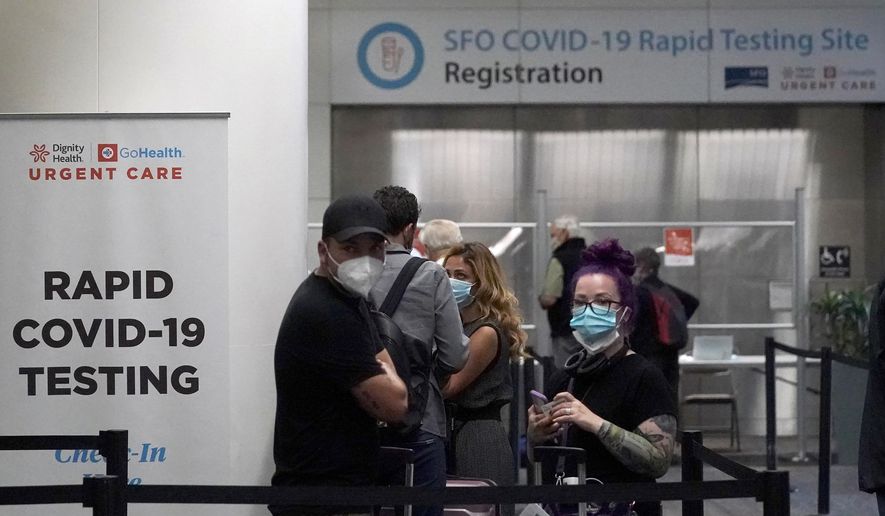The International Brotherhood of Teamsters demands its members’ rights not be violated regarding the COVID-19 vaccine mandates, but the union took public measures to pressure its unvaccinated employees into taking the jab or leaving their jobs.
Various labor unions around the country are seeking vaccine mandate exemptions for their own members, but where they stand on their own employees may be different.
In the case of the Teamsters, the IBT holds different standards for its unvaccinated employees who work at its Washington, D.C., headquarters than the members it represents.
The Teamsters filed an Equal Employment Opportunity Commission complaint against United Airlines on behalf of its members on Sept. 22, relating to medical and religious exemptions of the airline’s vaccine mandate.
The charge accuses United of placing IBT-represented technicians who applied for religious or medical exemptions on involuntary, indefinite, unpaid leave for up to 12 months.
However, according to internal memos and employees that The Washington Times spoke to, IBT demanded similar compliance from its own unvaccinated employees.
Five days after President Biden’s executive order requiring all federal employees to receive the COVID-19 vaccination, IBT management sent an internal memo on Sept. 14 to employees working for the Teamsters’ D.C. office.
It described the union’s mandatory vaccination policy for entering the headquarters.
The memo gave a Sept. 20 deadline for all building employees to be fully vaccinated or have an approved medical or religious exemption to access the headquarters. If an exemption is approved, management will provide guidance on a case-by-case basis.
The Sept. 14 memo also included options for those not fully vaccinated and without approved exemptions, such as using available vacation leave to account for their absence during their in-building scheduled shifts.
Two weeks later, the IBT issued a follow-up memo to employees outlining a revised vaccination policy. The memo detailed a requirement to either be “fully vaccinated or adhere to a strict testing schedule and a series of safety protocols.”
These protocols include using restrooms designated only for unvaccinated IBT employees and not using the headquarters’ elevators unless there is a “legitimate, documented medical condition” requiring elevator use.
According to the memo, unvaccinated IBT employees can only use designated stairwells in the main and annex buildings.
Unvaccinated employees cannot be in the lounges or other areas where staffers congregate. An unvaccinated employee can also be assigned a new work location or have their job responsibilities change to “facilitate maintaining safety in the workplace.”
Finally, these employees have no telework option and must work an alternate five-day-a-week schedule.
“These safety protocols will be strictly enforced with progressive discipline, up to and including termination,” the memo stated. At least 40 IBT employees are known to be unvaccinated, says Lisa McClees, a member of OPEIU Local Union 2. This union represents members who work at the Teamsters headquarters.
In an interview, Ms. McClees told The Times she applied for a religious exemption two weeks before the Sept. 20 deadline to avoid the vaccine jab. Her employer, the Teamsters, made her abide by the rules for unvaccinated employees.
“I had to alter my schedule. I have to work nights and on the weekends. I can’t use the elevator. I have to use separate bathrooms,” Ms. McClees said. “I’m not allowed to eat and drink, but in certain areas. I have to wear a mask all the time, and I no longer have the ability to telework.”
IBT employees were required to choose to be either fully, partially, or not vaccinated on the form sent to them. Those who claimed they planned to be vaccinated were required to provide proof to the human resources department.
One senior-level staffer who preferred to remain anonymous for fear of retribution told The Times, “I’m not against vaccinations. I’m against not knowing what the vaccination is going to do to somebody within five years.”
The staffer added, “So, I would like to give it a little bit more time to see any effects of the vaccination… I’m just unclear why the vaccinated need to be protected from me.”
Those who choose not to be vaccinated can submit to twice weekly COVID-19 tests and working alternative schedules. Another option is to use available vacation time to account for built-in scheduled shifts.
After this leave is depleted, the employee can be placed on unpaid administrative leave, start the vaccination process or wait until the COVID-19 pandemic has “meaningfully receded.”
The final option for an IBT staffer who chooses to be unvaccinated is to resign immediately.
While some employees went forward with the vaccination process, others still had questions about the vaccine and faced further obstacles, Ms. McClees said.
“One of my coworkers, she hasn’t even been there that long. She got hired during the pandemic. So, she hasn’t been there. She has no leave to take, if she can’t be at work,” she said. “And she’s not able to work the 7 p.m. to 2 a.m. schedule that they want her to work.”
The Times reached out to the Teamsters and did not hear back.
• Kerry Picket can be reached at kpicket@washingtontimes.com.




Please read our comment policy before commenting.